- Home
- Patrick E. Andrews
Desperado Run (An Indian Territory Western Book 2) Page 2
Desperado Run (An Indian Territory Western Book 2) Read online
Page 2
“Làstima, too bad, Flacito,” Paco said. “But you can stay here for a while, if you want. What do you say?”
“I thank you kindly,” Ben said. He motioned to the tequila. “How come you’re drinking? You got something to celebrate?”
“Celebrate, mierda!” Paco swore. “This old world of ours is going to hell.”
“I know what my troubles is,” Ben said. “What’s your particular problem?”
“Civilization,” Paco answered. “That’s my problem. All the open country is getting cut up into farms with towns between them. It’s harder and harder to move livestock anymore. You keep stumbling into somebody or a new settlement that’s sprung up overnight. It’s putting me out of business, Flacito.”
“Yeah, things is changing, all right,” Ben mused after taking a swallow of tequila. “Getting hard to run for the same reason. That’s why I’m heading for Kiowa country in the Injun Territory.”
Paco nodded. “Good idea for you. You got friends over there and know where to hide. It’d take an army to dig you out.”
“Yeah,” Ben agreed. “I thought I’d drop off here on the way and see if there was anybody I knowed around. O’ course I wanted to hear the latest about what’s going on since I been outta touch.”
“There ain’t nothing going on—nada—until we can work out a way to carry on our business,” Paco said. “But I don’t think we can.”
“Then, I don’t reckon I’ll be staying long,” Ben said. “I’d best be back in the saddle mighty quick.”
“It’d be better if you slept here tonight,” Paco suggested. “Might as well get some rest while you got the chance.”
“Thanks,” Ben responded. “I’m gonna be riding long and hard before I get to where I’m headed.”
Paco lit a cigar. “Then, let’s have a few drinks, my old companero, and we’ll talk of former days—days of glory and danger—when men were men”—he laughed—”and the women were glad of it!”
“I’ll sure as hell drink to that,” Ben said, raising his tin cup.
Florita came in and wordlessly served both men generous amounts of the stew, then returned outside to eat by herself.
Ben watched the woman leave. “You reckon she’ll ever be fully civilized?”
“No,” Paco said shaking his head. “But when a man lives out here, she’s the only kind of woman to have, verdad?”
They consumed the meal quickly and pushed the bowls aside to begin an evening of slow talk that was only interrupted when Paco went outside to order Florita to unsaddle Ben’s horse and put the animal in their corral. Then he returned to the table.
The two men barely admitted they were in the twilight of their lives. Both had yet to reach the age of forty. But they knew that the encroachment of culture and its law and order was bringing their way of life to a close as sure as if they were doddering ancients in their nineties.
The evening ended with more reminiscences until they finally left the table to settle in for the night. Ben used his saddle and blankets—dutifully brought in by Florita—to bed down on the floor. He sank into a deep, dreamless sleep.
Toward dawn, Ben was instantly aroused by Paco’s hand on his shoulder. “Shhh,” the Mexican cautioned his friend. “You are going to have to leave pronto, Flacito.”
Ben, who had slept fully clothed, got to his feet with his Winchester in hand. “What’s going on?”
“There’s some of the boys here that’s got an interest in you,” Paco explained. “Seems there’s a reward, Flacito, and things are tough enough they mean to haul you in—dead or alive.”
“Goddammit!” Ben cursed. In the back of his mind he’d known that killing Marshal Jack Macon would bring him grief. He started to ask how Paco had found out there were men in the camp after him but he noticed Florita standing by the door. Obviously the woman kept on the alert and had either overheard a plot or been told of it by someone looking for a favor from her husband.
“I’d best see to my horse,” Ben said.
“He’s ready,” Paco said. “I had Florita saddle him up for you.”
“Obliged, Paco, I sure as hell appreciate this,” Ben said. He walked toward the door and looked at the Mexican’s wife. “Thanks, Florita.”
The woman looked at him stonily without acknowledging the expression of gratitude.
With a final wave, Ben went outside and leaped into the saddle. He pulled his hat down low over his face and let the horse meander to the western edges of the camp. Then he slapped the reins and galloped like hell for the open country as daylight eased over the eastern horizon.
Ben rode hard across the rise above the camp and dipped down into the prairie country before he settled the horse into a steady gait.
He managed to ride half the morning before they caught up to him. It was a clever ambush, brought off by men used to fighting and hiding on the wide openness of the plains. With no vegetation, they had used the rolling elevations of the terrain to hide their presence until they could approach close enough for an all-out attack.
Ben unmercifully spurred his horse until the animal felt the panic of its rider and, in a bid to outstrip the wind, tore across the grass as its pounding hooves kicked clods of dirt high into the air.
But the slug from the Henry .44 brought Ben’s mount down, and the rider suddenly found himself hurtling through midair before crashing painfully to the ground.
Chapter Two
Ben Cullen had been born and raised in the small town of Pleasanton, Kansas. Like most outlaws, he recalled his past life without a lot of happy memories. One of the most unhappy of these recollections had occurred some twenty-six years previously. At that particular time, Ben was ten years old. He had been watching through a picket fence at some children playing in their yard. His activity was interrupted by the high-pitched voice of an irritated woman standing on the porch of the house.
“Scat! Git!” she screeched.
Ben looked from the children to the woman with a quizzical expression on his face.
“I said git, boy!”
The severe-looking woman brandished a broom in his direction.
Ben, confused, looked around and behind him for a cat or dog. The words git and scat were for animals that one wanted to be rid of.
“You hear me, boy?”
“Ma’am?” Ben asked.
“I tole you to scat, didn’t I?”
A portly, balding man in his shirtsleeves came out of the house and stood beside the woman. “Who’re you yelling at, Minerva?”
“Oh, it’s that Cullen boy there. I don’t want him around the kids. You’d think even a no-account mother like his could take better care of him.”
“Trash! That’s what that woman is,” the man said. “Godamned trash!”
Ben had heard his mother referred to in derogatory terms before. He knew she lived a life completely different from most of the other women in town, but he knew of a few who were even more public about things his mother kept private. As usual, he swallowed his anger and ignored the gibes he really didn’t understand.
By then the couple’s children had turned their attention from playing to watch. The three of them trooped up to the fence. Ben smiled at them. He knew all three of the Beardsley kids—Oren, Maybelle, and Paul—from his casual and infrequent attendance at the local schoolhouse.
“Howdy,” Ben said in a friendly tone.
“What’re you doing here?” Oren Beardsley, the oldest boy and much larger than Ben, asked.
“Nothing,” Ben answered.
“I told you to git, boy!” Mrs. Beardsley exclaimed again in her shrill voice.
Ben, whose young mind couldn’t comprehend if she were serious about wanting him to leave or not, merely stepped back from the fence and stuck his hands in the pockets of his raggedy pants.
“Y’all want to play or something?” he asked the Beardsley kids.
“Not with you,” Oren said. “You’re a shit.”
“I ain’t,” Ben said. He now ful
ly sensed being unwelcomed, but a combination of stubbornness and pride made him ignore the truthfulness of the situation.
“Yeah! You’re a shit,” Oren said again. Then he laughed. “And you got a funny haircut too. Looks like somebody put a bowl on your head and cut around it.”
“No it don’t,” Ben said.
Beardsley walked up to the fence. “Hey, boy, didn’t you hear what you was told to do?”
“No, sir,” Ben answered with a weak smile.
“You was told to git! Now, goddammit! Git!”
Ben, suddenly afraid, backed out into the street. Oren gleefully yelled at him. “Go on, Ben Cullen, or I’m gonna chuck a rock at you.”
“Chuck one at him anyway,” the father said.
The boy immediately responded and Ben had to jump away from the missile. Others quickly followed as the other two children joined in the game and Ben was forced into an ignoble retreat.
He finally stopped running when he reached the edge of the small town. In that year of 1875 the settlement consisted of a growing number of residences as a small business district mushroomed to serve the farmers moving into the area. These tillers of the soil had taken advantage of the Homestead Act to establish themselves in new lives. They sowed their trust, sweat, and courage into the rich, fertile prairie earth with plows brought with them from worse lives back east.
Ben Cullen lived in a shack just outside of town with his mother and her most recent lover, a dark brooding Irishman named Flaherty.
Ben’s own father, a veteran of the Union army, had established a farm in the area after the war. He had contracted a fever in the military camp life he’d followed for three years. No doctor could ever properly diagnose the exact sickness he suffered from, but it and the hard life of pioneer farming knocked him out. He succumbed to pneumonia brought on by a devotion to his livestock during a particularly brutal blizzard.
Mrs. Cullen tried running the farm with hired hands, but just didn’t have the knack to make things come out to the better. She began selling the place off piece by piece until there was nothing left but a small parcel. Finally even that was gone and she took young Ben and moved into town. They lived reasonably well for a while, but when the money from the land sales finally gave out, his mother had to take in laundry and live on the handouts of more prosperous and charitable neighbors in order to survive.
By the time they were forced into the small shack they now called home, Mrs. Cullen had developed a fondness for drinking and had found that taking in lovers was more pleasurable than washing other folks’ dirty clothes. She settled into an alcoholic haze filled with many males. These men trooped through in a seemingly endless parade of gamblers, saddle tramps, and other social misfits.
Ben, ignored most of the time, got along well with the majority of his mother’s live-in companions, but now and then there would be one like Flaherty who made life more than a bit difficult for the little boy.
Sometimes on cold nights Flaherty would get tired of Ben’s presence and banish him outside, where he would sit and shiver until his mother and the man would drink enough to either pass out or forget he wasn’t supposed to be inside. Then, with numb hands and feet, he would snuff and wipe at his runny nose as he warmed himself beside the small fire in the shack’s old stove.
Ben went to school when he could. But there seemed to always be errands or occasional odd jobs that took him away from gaining an effective education. But he liked the schoolhouse. It was warm and clean, and, even though he was always far behind the other children his own age, the activities were interesting and he was frequently praised by the teacher for even the limited progress he made during his sporadic attendance.
And it was at the school that he got his first crush.
Maybelle Beardsley, his own age, was a honey blonde with the brightest, bluest eyes he had ever seen. Always dressed in a starched, ironed dress with her golden ringlets dancing in the sunlight, she seemed all the sweetness and goodness a girl should be to a ten-year-old growing up fast on the frontier.
His casual passing of the Beardsley home that day he was run off had been carefully planned with the hope of being invited inside to play. While it was true Oren always picked on him at school, Ben figured the larger boy wouldn’t do it at his own house. He fervently hoped to become friends with him so he could get closer to Maybelle.
But now, after the stinging humiliation of being run off like an unwanted stray dog, Ben went back to his mother’s shack and squatted in the sun, his mind turning over the treatment he had just received.
Ben stayed there in a thoughtful reverie as the hurt swept over him like the north wind over an isolated ranch. He felt a cry coming on, but he forced it back down, gritting his teeth against the heavy feeling of sadness grabbing at his insides.
A quarter of an hour later he had his emotions back under the cold control he’d developed over his scant years. He stood up, glad the shack was empty, to go inside to see if there was anything left to eat.
Ben Cullen continued this unhappy life for several more years. But by the time he was sixteen years old, his lot had improved substantially. He had moved out of his mother’s shack and away from the tormentors she took up as lovers. The boy had found a job at the local livery and feed store. The pay wasn’t much, but he was given a room in the attic above the business. In spite of his small size, he handled the heavy work with a cheerful determination that earned him the sincere gratitude of his employer, Art Larkin.
Ben’s work finally forced him to abandon forever his education, but his infatuation for Maybelle Beardsley never lost its intensity. Her father’s dry-goods store was only two doors down from the livery and Ben was able to see her now and then. It seemed she grew prettier with each passing year, and Ben’s life was devoted to his secret dream of someday winning her heart and love for his own.
He daydreamed of working hard and saving his money until he could open his own store. These fantasies never quite identified the line of business he was in, only the picture of himself in a fancy suit and shiny new shoes looking mighty prosperous to all the folks—particularly to Maybelle—as they walked by.
Then, in his mental theater, a financial disaster of sorts strikes the community. Like the business, this misfortune never quite identified itself in his mind, but the calamity forces the town into near bankruptcy. From the howling, weeping and hand-wringing townspeople, however, steps forth Benjamin Cullen, his face calm and sure with a steady set to his jaw and clear vision in his eyes.
As the local citizens gather about in a town meeting, with Maybelle seated very close, Ben stands up and begins, “Now listen, folks, here’s what we have to do.” The speech, also not clearly defined, is a humdinger that has all the answers to the dilemma. His talk ends with the people applauding, the businesses saved and Mr. Beardsley himself offering a blushing and smiling Maybelle’s hand to him in gratitude and admiration.
Of course there were also the more action-oriented scenes in these reveries of Maybelle falling in love with him. His favorite, played over and over in his mind, began with a gang of bandits who attack and try to drag off Mr. Beardsley until Ben fearlessly wades into them and single-handedly saves the man. Maybelle, of course, then throws herself at him in love and worshipful thanks. Sometimes his imagination let Maybelle herself be captured, and he would ride out to deliver her from their slimy grasp and take her back into town amid the cheering accolades of an admiring citizenry.
But the heart is ever impatient and even a boy like Ben Cullen knew that his best bet to win the girl would be more conventional methods such as at dances or socials.
At the community’s Annual Harvest Ball of 1881, Ben made the decision that the time had come for him to step forth and seriously begin courting Maybelle Beardsley.
And it would forever change his life.
He made a number of severe sacrifices over a period of months to save money. He skipped meals, sought no diversions, and hoarded every penny unless absolutely necessary
to spend. At one time he had a bad cough, but he would not lay out a cent to purchase any patent medicine to relieve the illness. Finally, with the yearly dance—the biggest and most important in the community—only a couple of days away, Ben Cullen started spending the money.
He began with the purchase of a secondhand suit from the livery’s owner. Mr. Larkin was even shorter than Ben, and he was half again as big around. While short in the sleeves and trousers, it tended to bag in the chest and especially the seat of the britches, but Mrs. Larkin took pity on him and kindly altered it so the suit fit decently. Ben had also spent some of his savings on a new shirt with a high stiff collar and an outdated, cheap cravat. But he went all out for his shoes. These had been at Beardsley’s store and they were high-button two-tones with black bottoms and bright yellow tops. Ben thought they were the most elegant examples of footwear he had ever seen—no matter if they were a trifle large.
The final preparation was a trip to the barber shop on the afternoon of the grand social event. Ben didn’t stint here either. He laid out a whole dollar and a quarter. Not only did he get a shave, but he had his hair carefully cut, oiled, and combed into a shiny arrangement that made him right up to style for Pleasanton, Kansas. In fact, all this made Ben quite a dandy; he was up-to-date and top-quality.
When the evening of the ball arrived, Ben carefully dressed in his room in the livery attic, taking care not to muss his hair. Again his mind conjured up visions of his successful courtship of Maybelle Beardsley. This time the scene was the dance hall—actually the local militia armory—and Maybelle casually glances around as Ben just happens to step into the door. Her eyes open wide in feminine admiration as he strides into the building resplendent in haircut, new suit, and shoes. The band suddenly begins playing and he turns to her and, in a manly voice, asks her to dance. Then, as they whirl about the floor, Maybelle Beardsley falls deeply and forever in love with him. After the dance he escorts her home where, she nearly swoons with joy when he asks if he can become a regular caller at her house.
Reality was cruel at the very start of the evening. When Ben first entered the armory he couldn’t see Maybelle anywhere. A quarter of an hour later, he caught a glimpse of her dancing with another fellow ... then another ... and another ... until she finally took a seat among some other girls near the refreshment table.

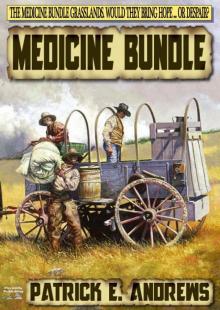 Medicine Bundle
Medicine Bundle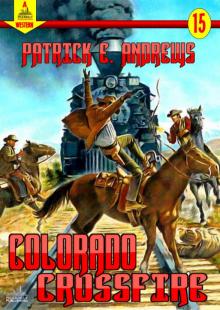 Colorado Crossfire
Colorado Crossfire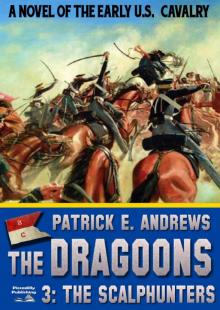 The Dragoons 3
The Dragoons 3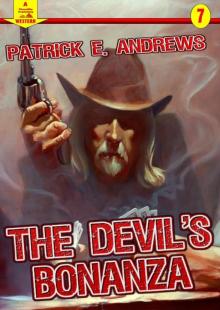 The Devil's Bonanza (A Piccadilly Publishing Western Book
The Devil's Bonanza (A Piccadilly Publishing Western Book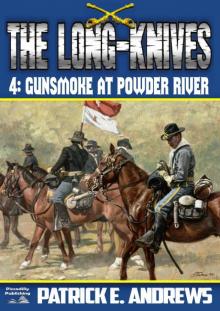 Gunsmoke at Powder River (The Long-Knives #4)
Gunsmoke at Powder River (The Long-Knives #4)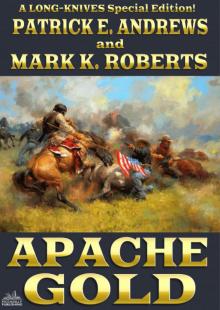 The Long-Knives 6
The Long-Knives 6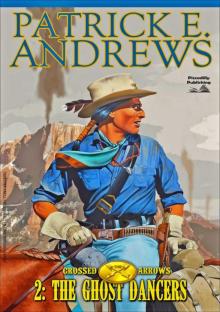 The Ghost Dancers (A Crossed Arrows Western Book 2)
The Ghost Dancers (A Crossed Arrows Western Book 2)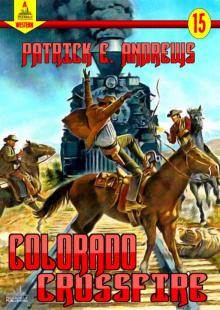 Colorado Crossfire (A Piccadilly Pulishing Western Book 15)
Colorado Crossfire (A Piccadilly Pulishing Western Book 15)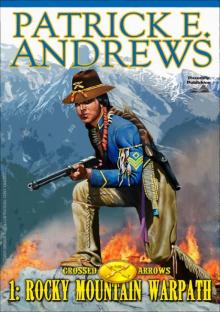 Rocky Mountain Warpath (A Crossed Arrows Western Book 1)
Rocky Mountain Warpath (A Crossed Arrows Western Book 1)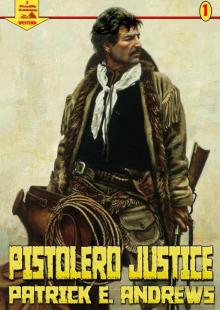 Pistolero Justice (A Piccadilly Publishing Western
Pistolero Justice (A Piccadilly Publishing Western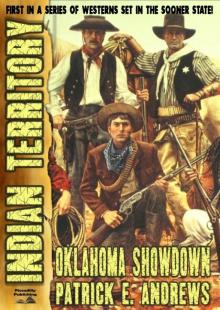 Oklahoma Showdown (An Indian Territory Western Book 1)
Oklahoma Showdown (An Indian Territory Western Book 1)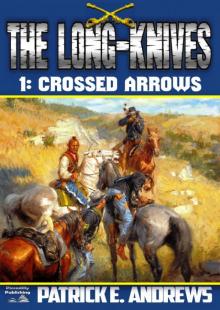 Crossed Arrows (A Long-Knives Western Book 1)
Crossed Arrows (A Long-Knives Western Book 1)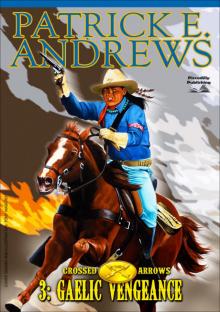 Crossed Arrows 3
Crossed Arrows 3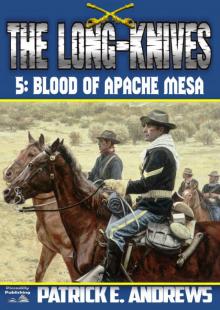 Blood of Apache Mesa
Blood of Apache Mesa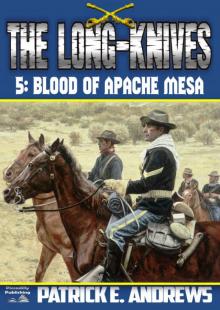 The Long-Knives 5
The Long-Knives 5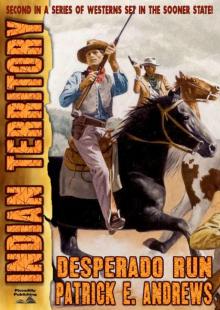 Desperado Run (An Indian Territory Western Book 2)
Desperado Run (An Indian Territory Western Book 2)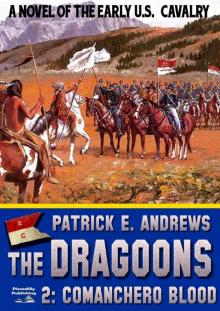 Comanchero Blood (A Dragoons Western Book 2)
Comanchero Blood (A Dragoons Western Book 2)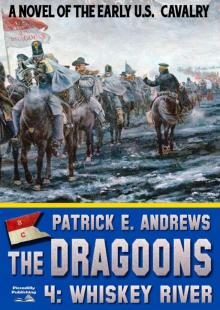 The Dragoons 4
The Dragoons 4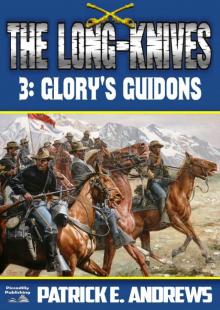 Glory's Guidons (The Long-Knives US Cavalry Western Book 3)
Glory's Guidons (The Long-Knives US Cavalry Western Book 3) Indian Territory 3
Indian Territory 3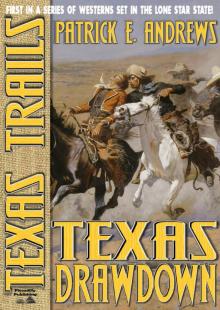 Texas Trails 1
Texas Trails 1